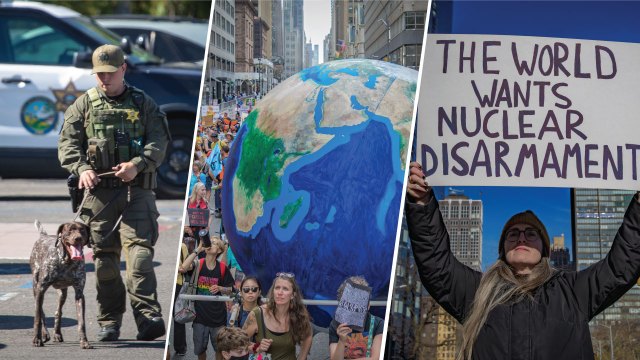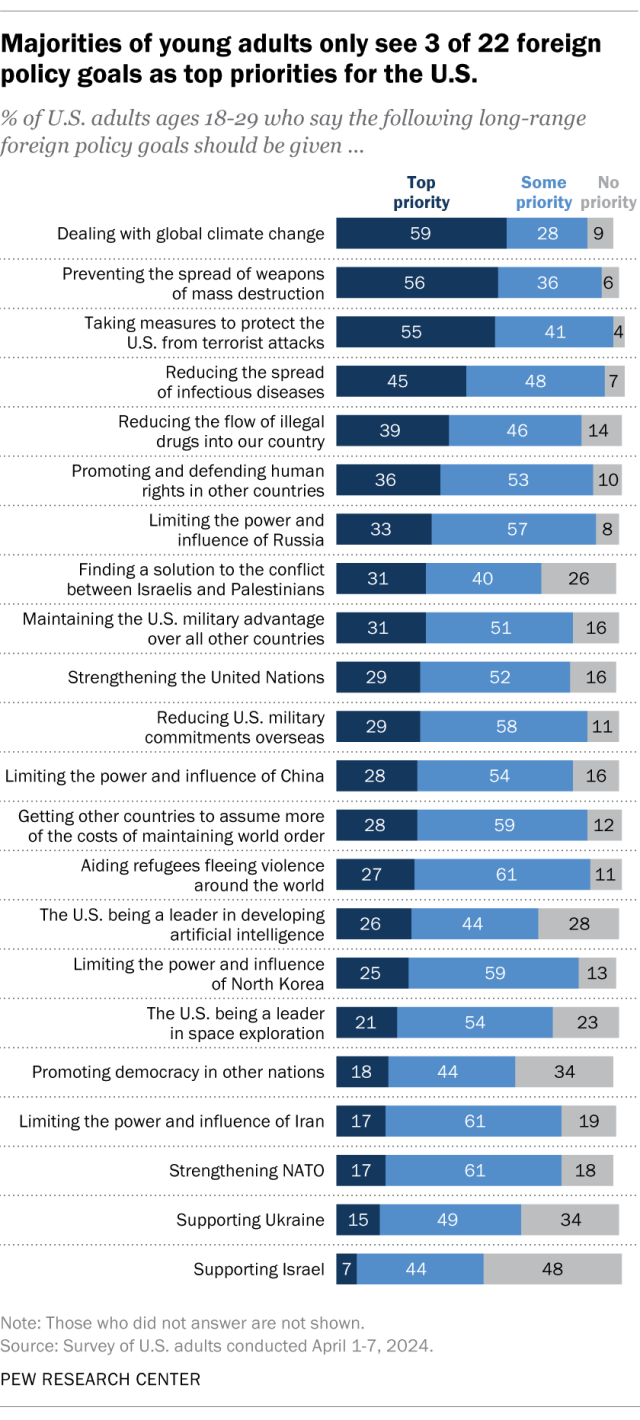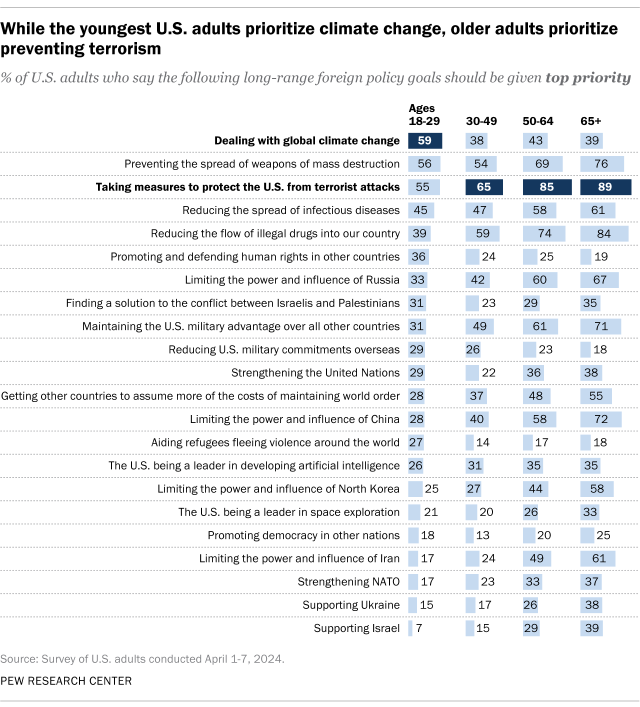
Majorities of U.S. adults under 30 say dealing with global climate change (59%), preventing the spread of weapons of mass destruction (56%) and taking measures to protect the United States from terrorist attacks (55%) should each be a top foreign policy priority for the country.
These three issues stand out as the only ones that majorities of young adults see as top priorities, according to a recent Pew Research Center survey that asked about 22 long-term foreign policy goals.
Pew Research Center conducted this analysis to understand how Americans’ long-term foreign policy priorities differ by age. We surveyed 3,600 U.S. adults from April 1 to 7, 2024.
Everyone who took part in this survey is a member of the Center’s American Trends Panel (ATP), an online survey panel that is recruited through national, random sampling of residential addresses. This way, nearly all U.S. adults have a chance of selection. The survey is weighted to be representative of the U.S. adult population by gender, race, ethnicity, partisan affiliation, education and other categories. Read more about the ATP’s methodology.
Here are the questions used for this analysis, along with responses, and its methodology.
Around a third or more of young adults also prioritize:

- Reducing the spread of infectious diseases (45% say this should be given top priority)
- Reducing the flow of illegal drugs into our country (39%)
- Promoting and defending human rights in other countries (36%)
The April survey specifically asked about Americans’ foreign policy goals. When it comes to the public’s domestic priorities, young adults place less emphasis on climate change than on other issues, including strengthening the economy, improving education and reducing health care costs, according to a separate Center survey conducted in January.
Young adults’ views on supporting other countries
In our April survey about foreign policy goals, we find that many young adults do not prioritize several ways of supporting other countries.
This is particularly true when it comes to Israel: 48% of 18- to 29-year-olds say supporting Israel should be given no priority – the highest share of young adults who say this about any foreign policy goal we asked about. Around a quarter (26%) also say finding a solution to the conflict between Israelis and Palestinians should be given no priority.
In a separate February survey, we found that young adults are more than twice as likely to say the U.S. should play no role in diplomatically resolving the Israel-Hamas war as they are to say it should play a major role (29% vs. 13%). However, another 25% said they weren’t sure.
When it comes to other foreign policy goals, the April survey finds 34% of young adults say that supporting Ukraine should not be a priority, and an identical share say this about promoting democracy in other nations.
Young adults also do not especially prioritize two technological goals included in the April survey: being a leader in developing artificial intelligence and being a leader in space exploration. For example, just 26% of U.S. adults under 30 say that leading the way on AI should be given top priority. A similar share (28%) says this should be given no priority.
How do young adults’ foreign policy goals compare with those of older adults?
While dealing with global climate change is a top foreign policy priority for about six-in-ten young adults, it is a lower priority for older adults. Some 38% of adults ages 30 to 49 say it should be a top priority, as do 43% of those 50 to 64 and 39% of those 65 and older.
In fact, global climate change ranks 11th out of the 22 policy goals among adults 65 and older, based on the share who say it should be a top priority. It ranks 11th among those ages 50 to 64 and eighth among those 30 to 49.

Among young adults
Climate change is one of only two policy goals we asked about where the youngest adults prioritize it more than all older age groups. The other is promoting and defending human rights in other countries. On this issue, 36% of adults under 30 – but no more than a quarter of adults in older age groups – say it should be a top priority.
Among adults ages 30 and older
For adults ages 30 and older, the top priority is protecting the U.S. from terrorist attacks. These adults were alive for, and are likely to remember, the terrorist attacks of Sept. 11, 2001, unlike many 18- to 29-year-olds.
The other top priorities for those ages 30 and older are reducing the flow of illegal drugs into the U.S. and preventing the spread of weapons of mass destruction (WMD). Both of these issues are most important to the oldest Americans: 84% of those 65 and older say reducing the flow of illegal drugs should be given top priority, and 76% say the same about WMD.
Sizable shares of adults ages 30 and older, and especially those 65 and older, also prioritize:
- Limiting the power and influence of China
- Maintaining the United States’ military advantage over all other countries
- Limiting the power and influence of Russia
About two-thirds or more of adults 65 and older say each of these goals should be given top priority, as do about four-in-ten or more among those ages 30 to 49 and 50 to 64. In contrast, only about a third or fewer of adults under 30 say these should be top priorities.
This is consistent with past Center research showing that older Americans are more likely than younger adults to perceive global conflicts – including those between China and Taiwan and between Russia and Ukraine – as important to U.S. national interests. Older Americans are also much more concerned than younger ones about Ukraine being defeated and taken over by Russia.
Similarities across age groups
One policy goal where younger and older adults don’t differ much is finding a solution to the conflict between Israelis and Palestinians. In each age group surveyed, about a third or fewer say the Israel-Palestine conflict should be given top priority, while the largest shares say it should be given some priority.
